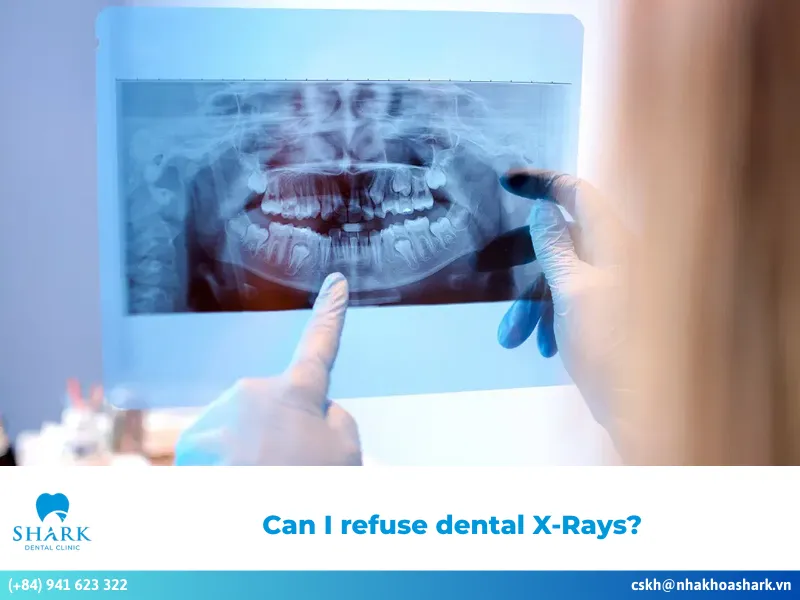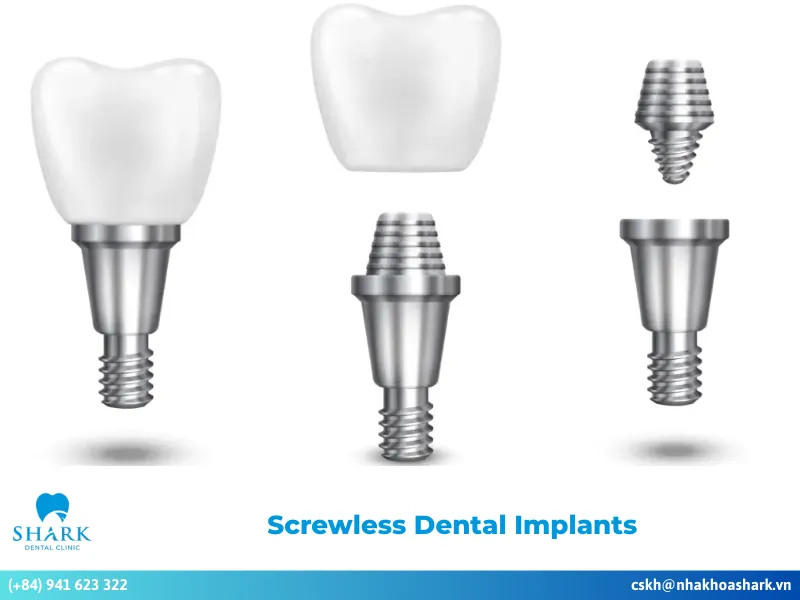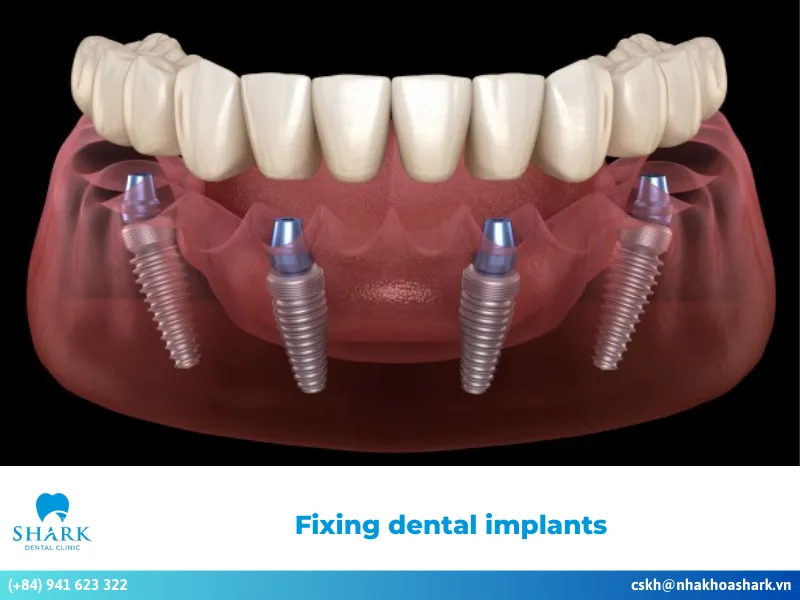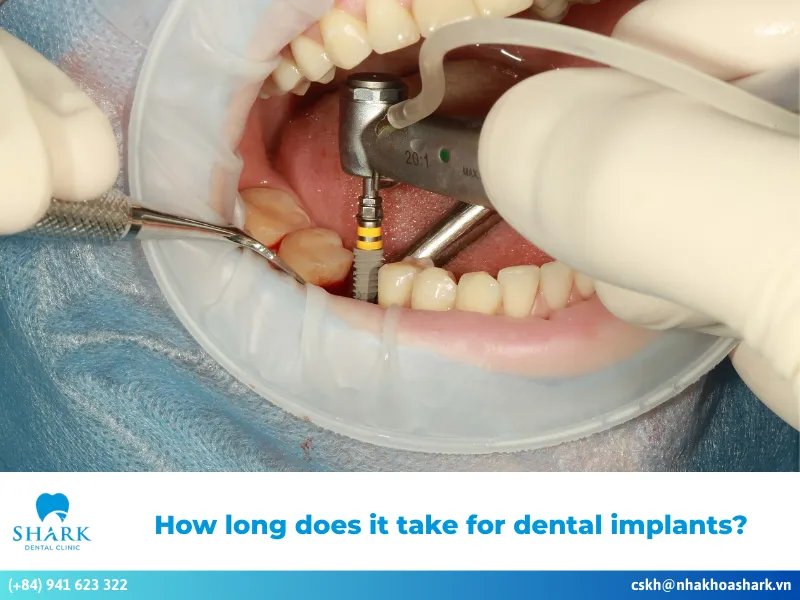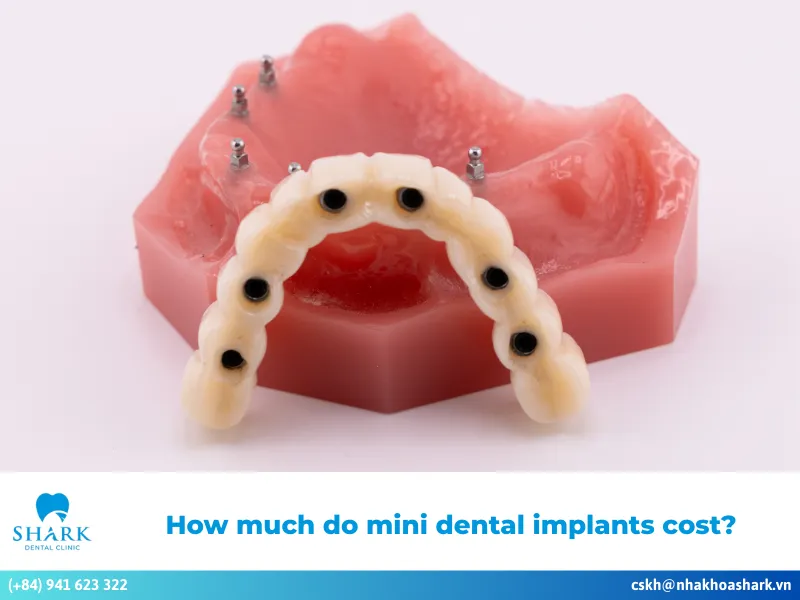A black tooth after root canal treatment is a common issue that can cause anxiety for patients. What are the main causes, how can it be treated, and what preventive measures can be taken to avoid tooth discoloration after root canal therapy? Let’s explore the details in this article by Shark Dental Clinic.
Causes of black tooth after root canal
A black tooth after root canal treatment appears darker or discolored compared to surrounding natural teeth. This phenomenon is relatively common and can result from daily habits, lifestyle choices, or structural changes within the tooth. Identifying the cause of the discoloration is essential to finding effective and safe treatment solutions.
- Residual pulp tissue or blood: If technical errors occur during root canal treatment, or if the dentist lacks experience, remnants of pulp tissue or blood may be left in the canal. Over time, these fragments can decompose and lead to gradual darkening of the tooth.
- Changes in dentin: Dentin, the layer beneath the enamel, plays a significant role in tooth color. After pulp removal, dentin loses vital nutrients, becomes brittle, and is more susceptible to discoloration. Consequently, teeth may appear darker than nearby teeth post-treatment.
- Effects of filling materials: After root canal treatment, the canal must be sealed. If low-quality or non-standard filling materials are used, they may be incompatible with tooth enamel, leading to discoloration. Many patients notice their teeth darkening over time due to this issue.
- Changes in tooth structure: Over time, teeth without pulp nutrition may experience degeneration and discoloration. The organic components of the tooth change, making it more vulnerable to darkening, particularly if you frequently consume foods and beverages with strong pigments.
In summary, a black tooth after root canal treatment can result from various factors, including lifestyle habits, the technical quality of the procedure, and natural structural changes in the tooth. Based on the underlying cause and the condition of your teeth, dentists can recommend the safest and most effective treatment methods.
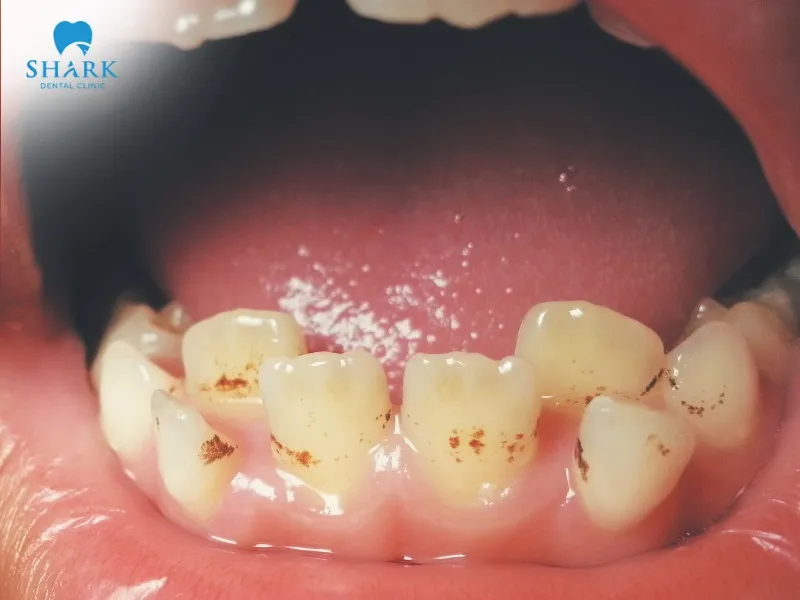
Is it okay for teeth to turn black after root canal treatment?
Many people feel anxious when they notice their tooth becoming discolored after root canal treatment. This condition is not uncommon and does not directly threaten oral health. However, a black tooth can significantly impact aesthetics and lead to a loss of confidence in social interactions.
Some consequences of blackened teeth after root canal treatment include:
- Aesthetic concerns: Darkened or blackened teeth, especially in visible areas like the front teeth, can detract from the natural appeal of a smile. This not only reduces dental aesthetics but also affects overall facial harmony. Tooth discoloration can accelerate the appearance of facial aging, diminishing quality of life and self-confidence.
- Increased risk of brittleness and fracture: If your tooth darkens after a root canal treatment, it indicates that the tooth has lost vital nutrition from the pulp. As a result, its structure becomes weaker, more brittle, and prone to breaking.
- Risk of reinfection: In some cases, tooth discoloration following a root canal may not just be a cosmetic issue; it can also signal a hidden infection. Bacteria or necrotic tissue left inside the canal can continue to spread, causing gum swelling or even leading to the formation of an abscess after root canal.
- Reduced lifespan of natural teeth: Darkened, brittle, and fragile teeth are more susceptible to permanent damage. This can negatively impact chewing, communication, and may eventually result in tooth loss, requiring restorative interventions.
In conclusion, a black tooth after a root canal can affect your overall dental aesthetics and carry risks such as reinfection or decreased tooth function. Depending on the underlying cause, it’s vital to visit a reputable dental clinic and adhere to your dentist’s treatment plan to preserve your natural teeth and minimize serious oral complications.
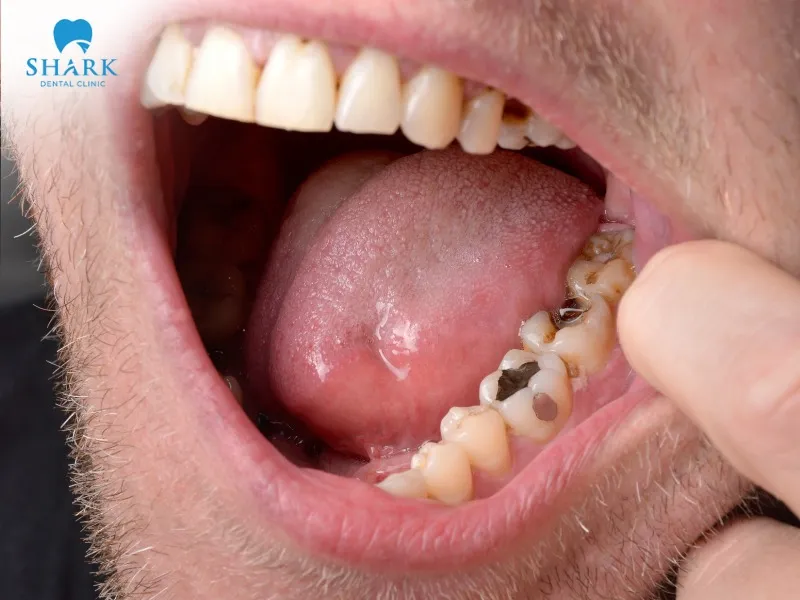
How to fix black tooth after root canal treatment?
Tooth discoloration after a root canal can make many people feel less confident in their communication and daily life. If you are experiencing this issue, consider the following treatment options:
- Removal of necrotic pulp tissue: If remnants of pulp tissue are left inside the canal, they must be completely removed to preserve the tooth structure and prevent reinfection. During this procedure, the dentist will clean the canal, disinfect the tooth, seal it with suitable materials, and place a dental crown if necessary.
- Apicoectomy (Root-end surgery): If root canal treatment does not yield the desired results and surrounding tissues show signs of serious infection, an apicoectomy may be considered. This procedure involves removing the tip of the tooth root along with the infected tissue around it, effectively preventing reinfection.
- Use of pain relievers and antibiotics: In cases where discoloration is associated with pain and inflammation due to infection, prescribed painkillers and antibiotics may be necessary. These medications help control the infection and reduce discomfort. However, it is essential to strictly follow the dosage and instructions provided by your dentist.
- Tooth extraction: If a tooth has lost all its function and the damage is irreversible, extraction may be the only viable option. After the extraction, your dentist will recommend suitable restorative solutions, such as dental implants, bridges, or removable dentures.
>>> See more: What is the best antibiotic for root canal infection?

If tooth discoloration is mild and the structure of the tooth remains intact, you may consider cosmetic whitening methods, including:
- In-office teeth whitening: This professional method uses bleaching agents combined with light energy to trigger an oxidation reaction, breaking down pigment molecules within the enamel and dentin. It delivers quick results without compromising the actual tooth structure.
- At-home whitening: This option involves using custom trays filled with whitening gel to whiten your teeth at home. However, it works more slowly than in-office treatments, and using low-quality whitening gels may pose risks to your oral health.
It is essential to note that whitening non-vital teeth only provides temporary improvement in color. It does not address underlying issues such as infection or loss of function. Therefore, visiting a reputable dental clinic for professional advice and safe treatment is the best option.
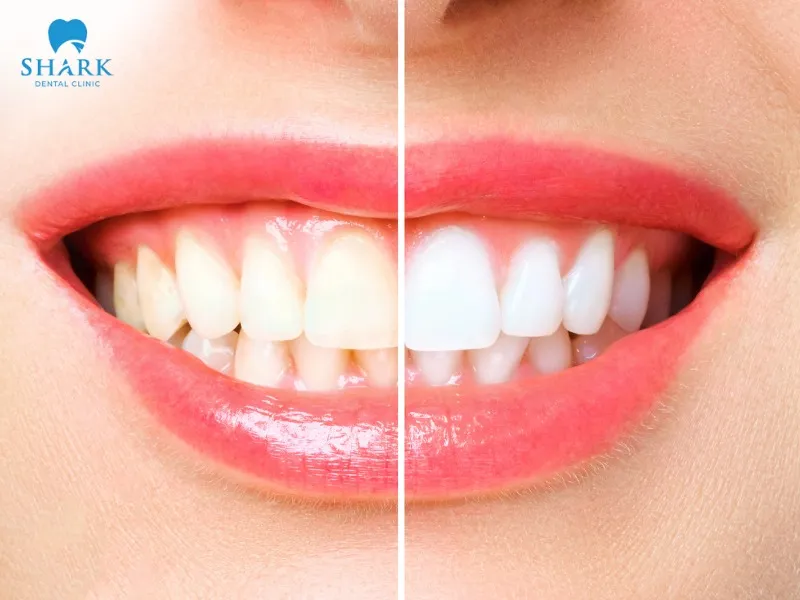
How to prevent black tooth after root canal treatment?
A black tooth after root canal treatment can be prevented, and the risk of infection reduced by practicing proper care. Here are some preventive measures:
- Choose high-quality filling materials: After undergoing root canal treatment, it’s essential to seal the canal to minimize the risk of infection. Take the time to research and select high-quality filling materials from reputable brands to avoid discoloration, commonly referred to as “black tooth,” after the procedure.
- Consider porcelain crowns or veneers: Teeth often become discolored following root canal treatment, which can impact the overall aesthetics of your smile. Therefore, it is advisable to consider porcelain crowns or veneers soon after the treatment to maintain bright, white teeth and ensure the visual appeal of your smile.
- Maintain a balanced diet: After root canal treatment, it is important to establish a healthy diet. Focus on consuming soft, nutritious foods while limiting carbonated drinks, sugary items, and acidic products to prevent tooth discoloration.
- Practice good oral hygiene: Regular brushing of your teeth, at least 2–3 times per day, is crucial. Effective brushing helps prevent bacteria buildup, reduces the risk of infection, and minimizes the chances of tooth discoloration after treatment.
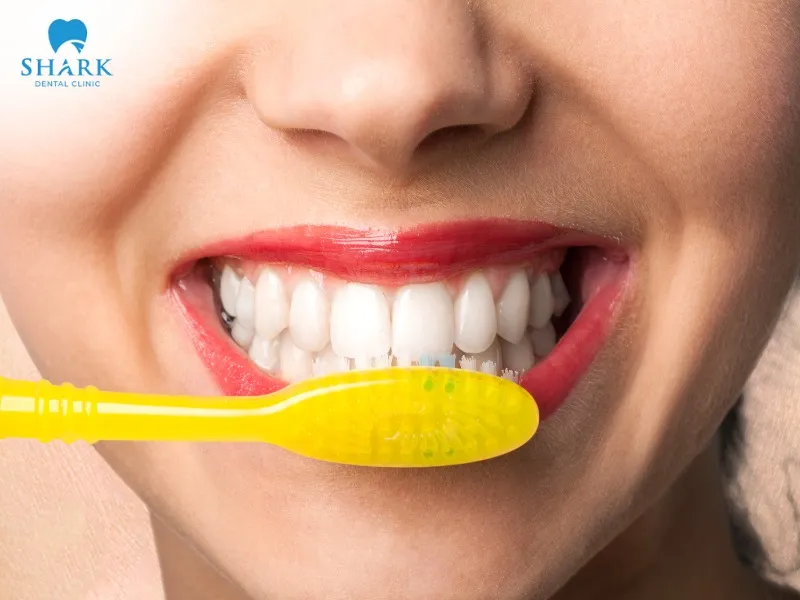
In addition to these measures, remember to schedule regular dental check-ups. Dental visits enable your dentist to identify any abnormal issues early and provide the appropriate treatment to address discoloration and prevent potential infections.
A black tooth after root canal treatment not only affects aesthetics but also poses various risks, including infection and reduced tooth functionality. Understanding the underlying causes will help you address the issue effectively and better protect your oral health. With the information provided in this article, you should now be better equipped to take care of your teeth and maintain a healthy, confident smile.





